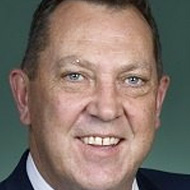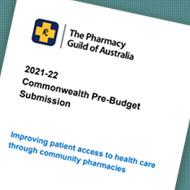A wide range of consumer and professional groups – including the Pharmaceutical Society of Australia, the Consumers Health Forum, Green Senator Rachel Siewert, Harm Reduction Australia, and Better Access Australia – have supported calls made in the Pharmacy Guild’s pre-budget submission for changes to be made to the Opioid Dependence Treatment Program.
In the submission, the Guild stressed improved patient access to healthcare through community pharmacies needed to be a health priority in the 2021-22 Federal Budget. It highlighted access to, and affordability of, opioid dependence treatment by implementing a nationally consistent program as part of the PBS. Under the Guild’s proposal, the Government would fund the dispensing and daily dose management for opioid dependence treatment, making the service more affordable and accessible for patients.
PSA’s National President Associate Professor Chris Freeman said the organisation supported the reforms the Guild proposed in its 2021-22 pre-Budget submission.
"There is no doubt that patients who are receiving treatment through the Opiate Dependence Treatment Programs have out of pocket costs that are disproportionate to other patients who have chronic disease," he said.
"We support the Pharmacy Guild of Australia's pre-budget submission as a pragmatic, consumer-focussed, and fiscally prudent strategy to reduce these out-of-pocket costs for consumers.
“This would put patients who are receiving ODT on an equal footing with other patients who have chronic disease and access medicines through the PBS.”
Greens Senator Rachel Siewert told BioPharmaDispatch the discriminatory arrangements for the Opiate Dependence Treatment Program were "grossly unfair" and "need to change".
In a statement, Harm Reduction Australia has drawn the attention of the Minister for Health, Greg Hunt, to the inequity of patient access to subsidised medicines, stating that “It is incredibly unjust for the tens of thousands of patients walking into a pharmacy or clinic today to continue to be denied the same access to PBS listed medicines as everyone else.”
The statement went on to say: “HRA has long argued that these private dispensing fees, that can amount to $50-$200 per month, are unfair and a significant barrier to accessing treatment.”
“The community would not accept a cancer patient or diabetic being asked to hand over at least $50 a week to access their PBS-funded medicines.”
Harm Reduction Australia’s pre-Budget submission is available here.
Chief Executive Officer of the Consumers Health Forum Leanne Wells said the organisation supported calls for the Government to remove the financial discrimination within the PBS against people on Opioid Dependence Treatment.
It supported requests for the Government to standardise the payments charged for access to ODT Program medicines consistent with monthly PBS script co-payments and to subsidise the additional [dose management] pharmacy services.
View the Guild’s pre-Budget submission.


